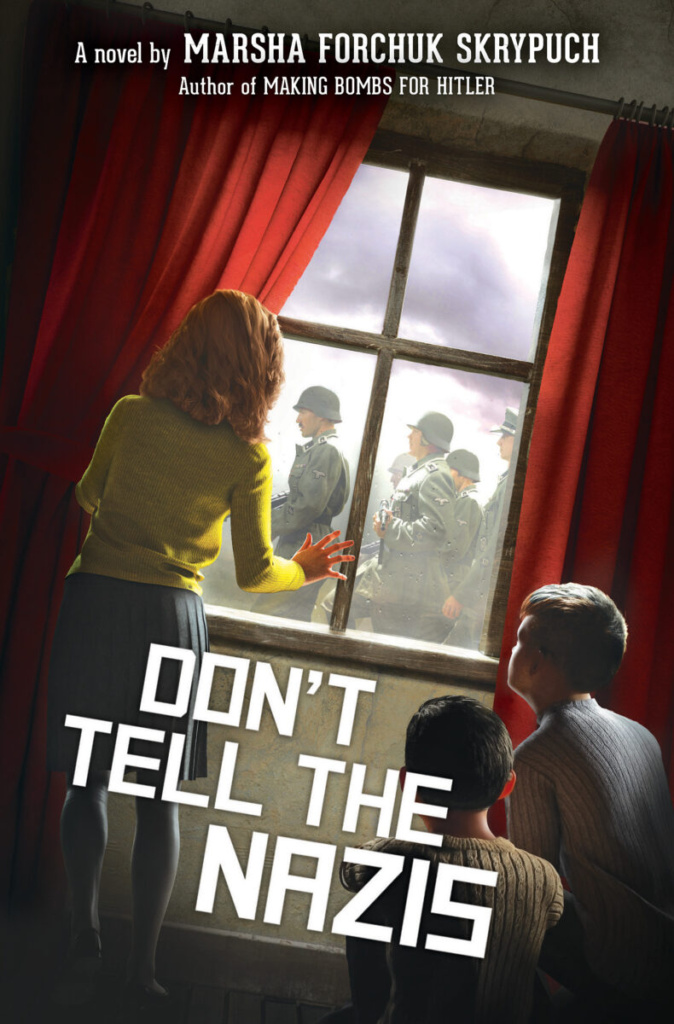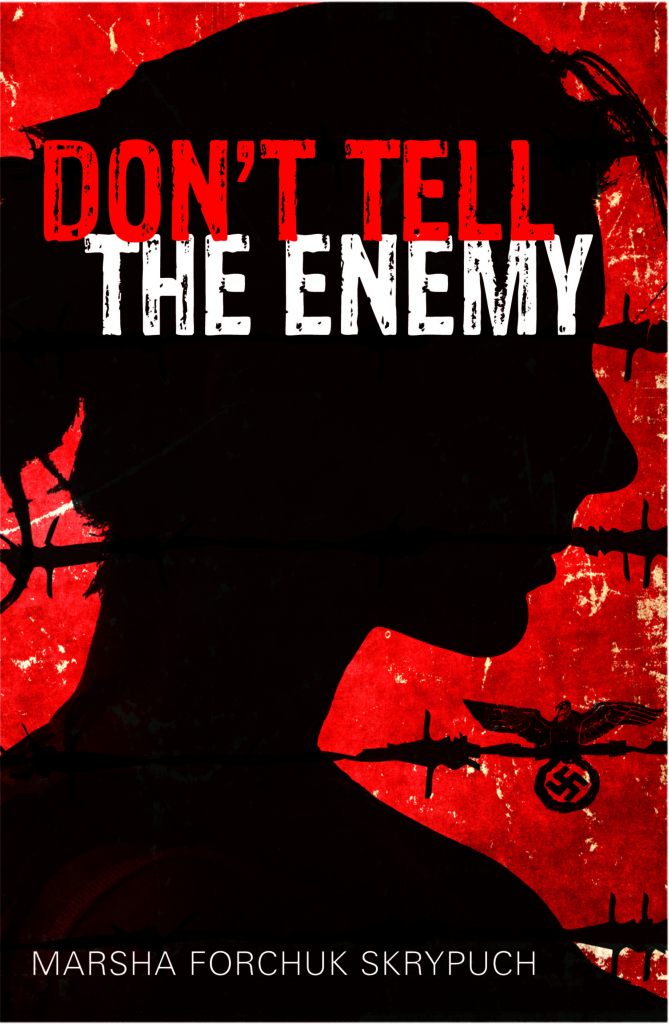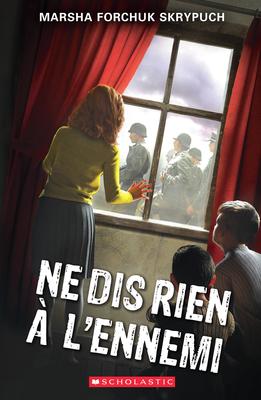


Previously published in Canada as Don’t Tell the Enemy.
Krystia’s family is hiding Jews from the invading Nazis, but the risks are immense. How much will she risk for her friends? A gripping story based on true events.
During the Soviet occupation of Ukraine during World War II, some of Krystia’s family are harrassed; others are arrested and killed. When the Nazis liberate the town, they are welcomed with open arms. Krystia’s best friend Dolik isn’t so sure. His family is Jewish and there are rumours that the Nazis might be even more brutal than the Soviets.
Shortly after the Nazis arrive, they discover a mass grave of Soviet prisoners and blame the slaughter on the Jews. Soon, the Nazis establish ghettoes and begin public executions of Jews.
Krystia can’t bear to see her friends suffering and begins smuggling food into the ghetto. When rumours circulate that the ghetto will be evacuated and the Jews will be exterminated, Krystia must decide if she’s willing to risk her own family’s safety to save her friends.
Here’s the book trailer:
Marsha Forchuk Skrypuch (author of Making Bombs for Hitler) crafts a story of ultimate compassion and sacrifice based on true events during WWII
Reviews
Resourcelinks: Marsha Forchuk Skrypuch returns to her strength: fictionalizing for young readers the painful stories of oppressed peoples. As she states in her Author’s note, this novel is inspired by a true story of a courageous Ukrainian family…This novel is a tough read, as it reveals the worst of man’s inhumanity. But there is also inspiration in the courage and strength possible in the bleakest of circumstances.
Canadian Materials: 4/4 stars. Don’t Tell the Enemy is excellently paced, and the story unfolds at a rate that makes readers want to continue reading. The novel is also shorter which will appeal to reluctant readers. The narrator and all the principlal characters are dynamic and fully-realized. The use of some Ukrainian words throughout the book is a very nice touch that reminds the reader where the book is taking place. It is also interesting to note that Krystia does not come at the world with any bias; she does not dislike or hate the Germans when they arrive, but through her interactions with them, she makes decisions about who are the good people and who are the bad around her.
The impact of Don’t Tell the Enemy is profound as it shows, with realism, the atrocities of the Nazis and their treatment of people during the Second World War, and the impact they had on their victims and enemies. As members of the Ukranian resistance are working together to try to stop the Nazis, they have to do so in extreme secrecy or risk becoming victims. The innocence of the narrator allows readers into the world of someone who initially does not understand what is going on around her. This book does not shy away from the realities of what occurred during the Holocaust, and, as such, it is important reading material for teens so that they can better comprehend this period. Don’t Tell the Enemy is a must-have for any teen historical fiction collection.
Children’s Book News: When the Soviets took over Krystia’s little town
of Viteretz, Ukraine, they brutally killed Krystia’s uncle and cousin,
but before she and her family even had time to grieve their loss,
the Nazis had suddenly gained power. As a result, many Jews were forced to give up their homes and all their belongings to the Germans.
Close friends of Krystia’s family were suddenly sent to live
in the ghetto without permission to contact any Slavs outside the
ghetto gates. Krystia must find a way to protect her friends from the
Nazis and save them from starvation or worse — the death camps.
Skrypuch creates a very well thought-out protagonist in Krystia.
At the beginning of the story, she is portrayed as a meek character
who admires her younger sister for being so brave and strong. As
the story develops, Krystia gains courage and becomes the brave
heroine who clearly puts her friends and family before her own
safety.
Don’t Tell the Enemy is based on true historical events. It is a
powerful story about war, friendship, family and how far someone
will go to protect the people she loves. Skrypuch writes with plenty
of raw emotion, allowing the reader to understand what life was
like in the Ukraine when the Nazis took over. This book is highly
recommended as a read-aloud or novel study for junior / intermediate
students studying about the history of the Ukraine. It can be
utilized when learning about the Holomodor or The Great Famine
of Ukraine. Michelle Carabeo is a teacher at St. Catherine Catholic Elementary / Junior High School in Edmonton.
CanlitforLittleCanadians: The Soviets have oppressed the Ukrainian homeland of twelve-year-old Krystia Fediuk for centuries but their occupation since 1939 has been a reign of terror for the Ukrainians, Poles and Jews in the town of Viteretz with appropriation of homes, imposed hunger, deportation to slave camps and execution. With the Germans marching into Ukraine in 1941 and the Soviets fleeing, there are initial hopes and even proclamations of Ukrainian independence. But the good spirits that come with the egress of their oppressors and the bestowing of food, as well as the opening of the church, are soon suspended as the Nazis begin to show their true objectives.
…that the way to honor our family and friends was to be strong and to live and to tell their stories. (pg. 177)

